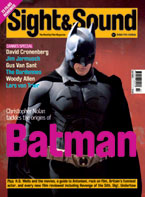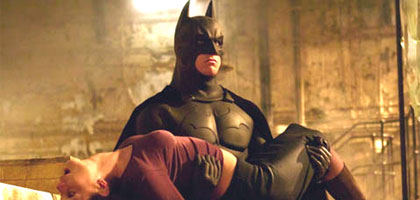
Batman Begins
UK/USA 2005

Reviewed by Edward Lawrenson
Synopsis
Our synopses give away the plot in full, including surprise twists.
Gotham City. Millionaire heir Bruce Wayne (Chritian Bale) grows up determined to avenge the murder of his parents by street mugger Joe Chill. Released early in return for testifying against crime boss Carmine Falcone (Tom Wilkinson), Chill is assassinated by Falcone's contact before Wayne can get to him. Having angered his childhood sweetheart Rachel Dawes (Katie Holmes) with his talk of vengeance, Wayne impulsively boards a cargo ship. Travelling the world, Wayne lives among petty thieves in his attempt to better understand the criminal mind.
In China, Wayne encounters the mysterious Ducard (Liam Neeson), who invites him to join a society dedicated to fighting crime: the League of Shadows, headed by Ra's Al Ghul (Ken Watanabe). He seeks this group out, where he is trained in combat skills. But Wayne rejects its vigilante approach to justice and fights his way out of the League's HQ; he returns to Gotham to fight crime on his own terms.
With the help of his butler Alfred (Michael Caine) and scientist Lucius Fox (Morgan Freeman), Wayne creates his crime-fighting persona, a caped figure who soon earns the nickname 'Batman'. While cultivating his public image as a spoilt millionaire, Wayne fights crime in Gotham as Batman. Interrupting a shipment of drugs, Batman secures the arrest of Falcone. Investigating this supply, Batman realises that some of the drugs are being diverted for specialist use. He discovers they are fear-inducing hallucinogens bound for corrupt crime psychologist Dr Crane (Cillian Murphy). Also suspicious is Rachel, now a DA, who is kidnapped by Crane. Rescuing her from Crane's HQ, Batman finds out that drugs are being pumped into Gotham's water supply.
Batman discovers that the League of Shadows, headed by Ducard (who has assumed the Ra's Al Ghul name), is behind a scheme to release Crane's hallucinogen into Gotham and cleanse the city of its corruption by causing mass rioting. But, after besting Ducard in combat, Batman prevents the League from activating a city-wide release of the drug and saves Gotham.
Review
Director Christopher Nolan is best known for Memento, an ingeniously structured crime film that told the story of its amnesiac hero's attempt to avenge his wife's murder in reverse chronology. The film's striking backwards-story arc inevitably attracted studio interest. After completing a solid job on the Al Pacino vehicle Insomnia, Nolan has been entrusted with reviving Warner Bros' big-budget Batman franchise. But while Memento was a decent cult success, its fractured, wilfully elliptical narrative owed more to a tradition of modernist art cinema - which Nolan had already explored in his haunting debut Following - than the sleek, pacey conventions of comic-book adaptations. Just as Bruce Wayne disappears behind Batman's anonymous black uniform, the question is: will Nolan's distinctive identity, the very thing that won him studio attention, be subsumed to the requirements of furnishing Warner Bros their tent-pole movie this summer?
In fact, in a film that frets over issues of identity (with its Bildungsroman-like focus on the early life of Batman's unmasked alter ego, it could happily be called Bruce Wayne Begins), Nolan's stamp is detectable throughout. For one the film's kaleidoscopic ordering of scenes, especially in the opening half hour, risks Memento-like confusion. It begins, in medias res, with a dream sequence (soon revealed as a flashback to Bruce Wayne's childhood), while the action shuffles between significant events in Wayne's young adulthood and an extended prologue set in a remote mountainous region of China (whose chilly majesty evokes the Alaskan setting of Insomnia). That Nolan can compress and elide so much detail while maintaining our interest testifies to both his assurance as a film-maker and our pre-existing awareness of the Batman myth. Indeed, so well known are Batman's many incarnations - even to non-devotees of the comic (this reviewer included) - that the film plays with expectations: for instance, Gotham City, more commonly imagined as a noirish hell hole, is first seen at day, a spruce monorail dissecting clean skyscrapers that stand proudly in the sunlight.
But our familiarity with the 'facts' of Batman's backstory also allows Nolan to concentrate on their psychological resonances. The killing of his parents - a significant aspect of Tim Burton's 1989 movie - is depicted in a clipped, almost perfunctory scene; instead we dwell on the killing's aftermath. Scenes depicting the newly orphaned Bruce being comforted by a kindly cop or his steely determination to avenge their deaths as a teenager (an excellent Christian Bale in chilly American Psycho mode) give the superhero a rich sense of shading. The conflicted attitude he demonstrates to revenge, a theme Nolan explored in Memento, is persuasively tackled here. While the bloodletting of Memento's forgetful hero is a mean, pointless act that doesn't even grant him catharsis, Wayne's refusal to follow the vigilante path of his mentor Ducard gives him the satisfaction of knowing he is better than his criminal antagonists. The film's disquisition on justice isn't, say, on a par with The Oresteia, and yet it's cheering to see an event movie subtly handle such issues so soon after the Manichean idiocies of Revenge of the Sith. It also makes for a deliciously ripe cameo from a besuited Liam Neeson as Ducard, whose ultra-reactionary thoughts on crime and punishment, delivered between combat sessions with Wayne, turn him into a suave, ninja version of Michael Winner.
Only occasionally does Nolan slip up: "You have learnt to bury your guilt with anger," Ducard tells Wayne, a rare instance of psychobabble. But when this line is delivered during an exhilaratingly staged swordfight on a vast ice lake, who's complaining? And it's the flair of the set pieces that really impresses. With action scenes that make sparing use of CGI, the film delivers a pleasingly robust sense of spectacle. It is also laced with a gleeful dose of PG-horror, especially in the zombie-like rampage of Gotham's entranced citizens in the film's final reel (which connects the element of urban dystopia present in many versions of Batman to George A. Romero's similarly bleak Dawn of the Dead). At over two hours, the film is too long, but Nolan's spirited take on this franchise wipes the slate clean after the tired mess of Batman & Robin; it is a welcome new beginning.
Credits
- Director
- Christopher Nolan
- Producers
- Emma Thomas
- Charles Roven
- Larry Franco
- Screenplay
- Christopher Nolan
- David S. Goyer
- Story
- David S. Goyer
- Based upon characters appearing in comic books published by DC Comics
- Batman created by
- Bob Kane
- Director of Photography
- Wally Pfister
- Edited by
- Lee Smith
- Production Designer
- Nathan Crowley
- Music
- Hans Zimmer
- James Newton Howard
